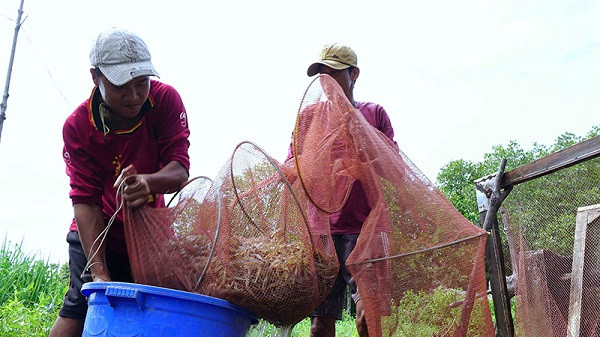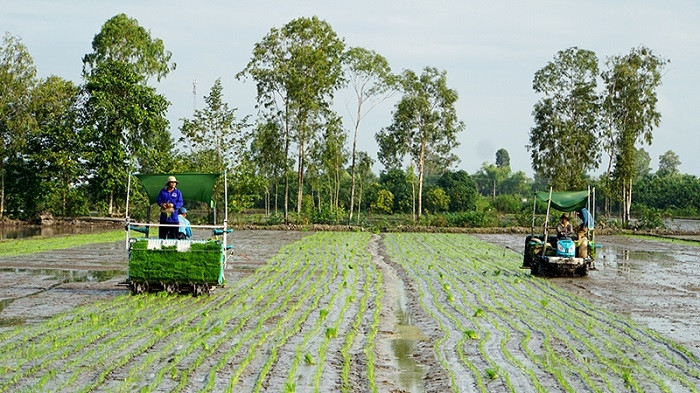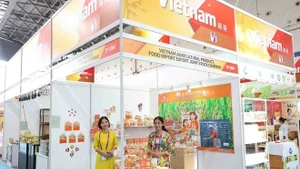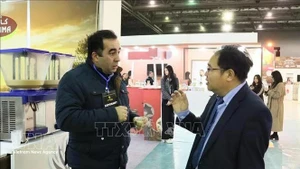The Mekong River Delta region supplies more than 90% of the country’s rice, 70% of its fruits, and nearly 50% of its seafood exports every year.
Ca Mau Province currently has nearly 35,000 hectares of shrimp farming in the coastal mangrove forests, mostly in the two districts of Nam Can and Ngoc Hien.
More than 22,000 hectares of which has been recognised for meeting standards of organic shrimp farming. Ca Mau is also the only locality in Vietnam to be certified by Naturland, an EU organic certification agency, for its nearly 7,000 hectares of shrimp farming in Ngoc Hien District.
Chairman of Ngoc Hien District People's Committee Tran Hoang Lac said that the district has developed three key communes for ecological shrimp farming, including Vien An, Vien An Dong and Dat Mui. Of which, 500 households in Vien An Dong Commune have achieved a green rating level granted by the US’ Seafood Watch organisation.
Organic shrimp and organic rice are set as key projects in Ca Mau Province’s project on agricultural restructuring project. In which, the province has a combined organic rice and shrimp farming area of more than 40,000 hectares, about half of which is located in Thoi Binh District.
According to the Vinh Long Provincial Department of Agriculture and Rural Development, dozens of organic farming models have been developed in the province, with more than 260 hectares having been granted Vietnam Agriculture Practice (VietGAP) certification.
Binh Hoa Phuoc Rambutan Cooperative in Binh Hoa Hamlet, Binh Hoa Phuoc Commune, Long Ho District, has 66 members growing off-season rambutan on a total area of 42 hectares, which generate an average annual output is 840 tonnes.
Director of the Cooperative Nguyen Ngoc Nhan said that in order to ensure the fruit’s quality and its market sale, the cooperative’s technical staffs closely work with farmers to provide them with instructions while inspecting and managing every stage in the production, harvesting and packaging.

Farmers harvest shrimp in mangrove forests in Ca Mau Province. (Photo: Huu Tung)
In Dong Thap Province, the provincial Sustainable Agriculture Transformation Project (VnSAT Dong Thap) has been implemented across six districts since 2016, covering 23 communes and 41 cooperatives.
The project aims to encourage local farmers to adopt the “three decreases – three increases” practices (decreasing the amount of seeds, pesticide and fertiliser used in cultivation while increasing rice productivity, rice quality and economic efficiency) and “one must – five decreases” practices (must use certified rice varieties; and decrease the amount of seeds cultivated, pesticides, fertiliser, water and post-harvest losses).
Under the project, farmers have also received investment in improving infrastructure and applying technology in rice farming while local cooperatives have been assisted to connect with businesses in order to produce safe products with higher value.
According to Prof. Dr. Vo Tong Xuan, the leading Mekong Delta agricultural expert, many green agricultural production models in accordance with VietGAP or GlobalGAP standards in the Mekong Delta have shown good results such as the mixed rice-shrimp farming model in coastal provinces, ecological crab farming in Ca Mau Province, and growing hydroponic vegetables and watermelon in net houses in Hau Giang Province. These models illustrate the local authorities and people’s shift towards green and safe agricultural production.
Associate Professor, Dr. Chau Minh Khoi from Can Tho University said that the State should provide farmers with further support to apply advanced science and technical achievements in production.
He also proposed farmers to gather together to establish cooperatives which can allow production on a larger scale while facilitating the transformation into green agricultural production.
In addition, localities need to opt for crop and livestock which are suitable for their natural conditions and adaptive to climate change in order to transform to green production while fostering digital transformation in agriculture and sustainable agricultural development.
















